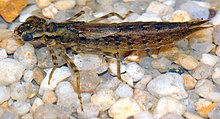Larve
Jump to navigation
Jump to search
German[edit]


Etymology[edit]
From Middle High German larve, from Latin lārva (“ghost; mask”).
Pronunciation[edit]
- IPA(key): /ˈlarfə/, [ˈlaʁ.fə], [ˈlaɐ̯-], [ˈlaː-], [ˈlaɾ-]
- IPA(key): /ˈlarvə/ (less common; see below)
Audio (file) Audio (Austria) (file) - The standard pronunciation is for this stem to be realised with /f/ when the preceding syllable has primary stress (as e.g. in Larven, entlarven), but with /v/ when the stress moves forward (as e.g. in larval, larviert). However, a minority of speakers may use /v/ in all prevocalic positions. Compare the same in Nerv.
- Hyphenation: Lar‧ve
Noun[edit]
Larve f (genitive Larve, plural Larven)
- (zoology) larva (early stage of growth for some insects and amphibians)
- (Southern Germany, Austria, Switzerland, otherwise archaic, literary) mask
- Synonym: Maske
- 1801, Friedrich Schiller, translated by Joseph Mellish, Maria Stuart, page 27:
- Verzeihung / Für diese verhaßte Larve, Königin, / Die mir zu tragen Kampf genug gekostet, / Doch der ich’s danke, daß ich mich euch nahen, / Euch Hülfe und Errettung bringen kann.
- Oh, pardon, / My gracious liege, for the detested mask, / Which it has cost me pain enough to wear; / Yet through such means alone have I the power / To see you, and to bring you help and rescue.
Declension[edit]
Declension of Larve [feminine]
Derived terms[edit]
- Aallarve
- Ameisenlarve
- Amphibienlarve
- Dassellarvenbefall
- Eilarve
- entlarven
- Entlarven
- Ephyralarve
- Fasnachtslarve
- Fischlarve
- Fliegenlarve
- Froschlurchlarve
- Gelsenlarve
- Insektenlarve
- Käferlarve
- Käsefliegenlarve
- Keulenwespenlarve
- Kleidermottenlarve
- Knoblauchkrötenlarve
- larvenähnlich
- Larvenähnlichkeit
- Larvenamarant
- Larvenanpassung
- Larvenart
- larvenartig
- Larvenbiologie
- Larvendasein
- Larvenentwicklung
- Larvenform
- larvenfressend
- Larvenfresser
- Larvengespinst
- Larvengewässer
- Larvenhäkchen
- Larvenhaut
- Larvenhülle
- Larvenökologie
- Larvenphase
- Larvenraupenfänger
- Larvenroller
- Larvensifaka
- Larvenstadium
- larventötend
- Larventötungsmittel
- Larvenwaldsänger
- Larvenzeit
- Leptocephalus-Larve
- Libellenlarve
- Marienkäferlarve
- Moskitolarve
- Mottenlarve
- Mückenlarve
- Nematodenlarve
- Primärlarve
- Prolarve
- Schlammfliegenlarve
- Schlupfwespenlarve
- Schmetterlingslarve
- Schnakenlarve
- Schwanzlurchlarve
- Stechmückenlarve
- Trochophoralarve
- Veligerlarve
- Vorlarve
- Weidenblattlarve
- Wespenlarve
- Zeckenlarve
- Zuckmückenlarve
Related terms[edit]
- entlarven
- larval
- Larval-
- Larvalanpassung
- Larvalbiologie
- larvale Form
- Larvalentwicklung
- Larvalfärbung
- Larvalgehäuse
- Larvalgespinst
- Larvalgewässer
- Larvalhabitat
- Larvalhäkchen
- Larvalhaut
- Larvalhäutung
- Larvallebensraum
- Larvalmerkmal
- Larvalökologie
- Larvalparasit
- Larvalperiode
- Larvalphase
- Larvalsystematik
- Larvalzeit
- larviert
- larvizid
- Larvizid
Further reading[edit]
- “Larve” in Duden online
- “Larve” in Digitales Wörterbuch der deutschen Sprache
 Larve on the German Wikipedia.Wikipedia de
Larve on the German Wikipedia.Wikipedia de Larve (Maske) on the German Wikipedia.Wikipedia de
Larve (Maske) on the German Wikipedia.Wikipedia de
Categories:
- German terms inherited from Middle High German
- German terms derived from Middle High German
- German terms derived from Latin
- German 2-syllable words
- German terms with IPA pronunciation
- German terms with audio links
- German lemmas
- German nouns
- German feminine nouns
- de:Zoology
- Southern German
- Austrian German
- Switzerland German
- German terms with archaic senses
- German literary terms
- German terms with quotations